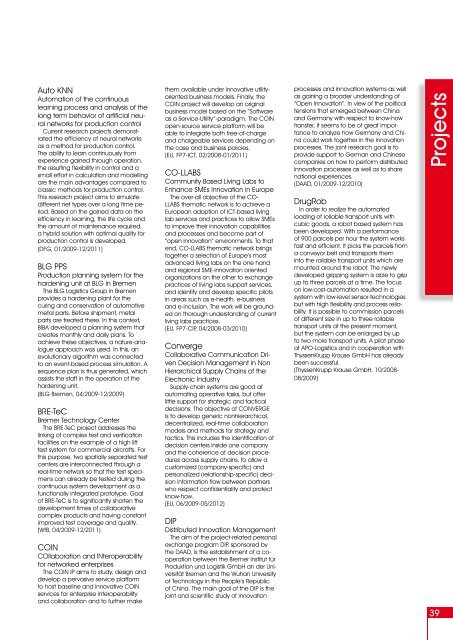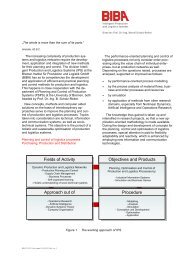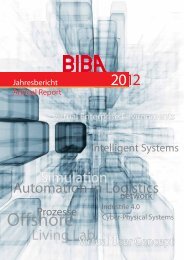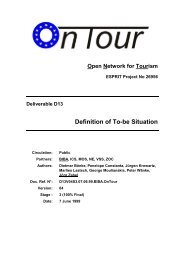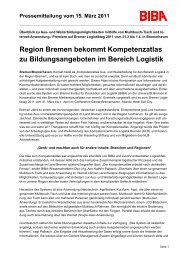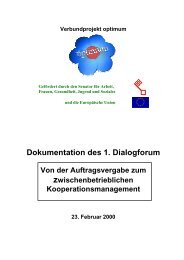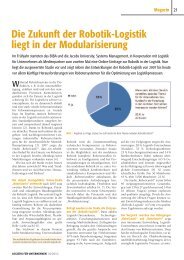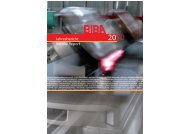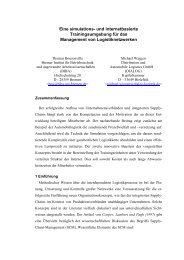Jahresbericht 2009 - Biba - Universität Bremen
Jahresbericht 2009 - Biba - Universität Bremen
Jahresbericht 2009 - Biba - Universität Bremen
Sie wollen auch ein ePaper? Erhöhen Sie die Reichweite Ihrer Titel.
YUMPU macht aus Druck-PDFs automatisch weboptimierte ePaper, die Google liebt.
Auto KNN<br />
Automation of the continuous<br />
learning process and analysis of the<br />
long term behavior of artificial neural<br />
networks for production control<br />
Current research projects demonstrated<br />
the efficiency of neural networks<br />
as a method for production control.<br />
The ability to learn continuously from<br />
experience gained through operation,<br />
the resulting flexibility in control and a<br />
small effort in calculation and modelling<br />
are the main advantages compared to<br />
classic methods for production control.<br />
This research project aims to simulate<br />
different net types over a long time period.<br />
Based on the gained data on the<br />
efficiency in learning, the life cycle and<br />
the amount of maintenance required,<br />
a hybrid solution with optimal quality for<br />
production control is developed.<br />
(DFG, 01/<strong>2009</strong>-12/2011)<br />
BLG PPS<br />
Production planning system for the<br />
hardening unit at BLG in <strong>Bremen</strong><br />
The BLG Logistics Group in <strong>Bremen</strong><br />
provides a hardening plant for the<br />
curing and conservation of automotive<br />
metal parts. Before shipment, metal<br />
parts are treated there. In this context,<br />
BIBA developed a planning system that<br />
creates monthly and daily plans. To<br />
achieve these objectives, a nature-analogue<br />
approach was used. In this, an<br />
evolutionary algorithm was connected<br />
to an event-based process simulation. A<br />
sequence plan is thus generated, which<br />
assists the staff in the operation of the<br />
hardening unit.<br />
(BLG <strong>Bremen</strong>, 04/<strong>2009</strong>-12/<strong>2009</strong>)<br />
BRE-TeC<br />
Bremer Technology Center<br />
The BRE-TeC project addresses the<br />
linking of complex test and verification<br />
facilities on the example of a high lift<br />
test system for commercial aircrafts. For<br />
this purpose, two spatially separated test<br />
centers are interconnected through a<br />
real-time network so that the test specimens<br />
can already be tested during the<br />
continuous system development as a<br />
functionally integrated prototype. Goal<br />
of BRE-TeC is to significantly shorten the<br />
development times of collaborative<br />
complex products and having constant<br />
improved test coverage and quality.<br />
(WfB, 04/<strong>2009</strong>-12/2011)<br />
COIN<br />
COllaboration and INteroperability<br />
for networked enterprises<br />
The COIN IP aims to study, design and<br />
develop a pervasive service platform<br />
to host baseline and innovative COIN<br />
services for enterprise interoperability<br />
and collaboration and to further make<br />
them available under innovative utilityoriented<br />
business models. Finally, the<br />
COIN project will develop an original<br />
business model based on the “Software<br />
as a Service-Utility”-paradigm. The COIN<br />
open-source service platform will be<br />
able to integrate both free-of-charge<br />
and chargeable services depending on<br />
the case and business policies.<br />
(EU, FP7-ICT, 02/2008-01/2011)<br />
CO-LLABS<br />
Community Based Living Labs to<br />
Enhance SMEs Innovation in Europe<br />
The over-all objective of the CO-<br />
LLABS thematic network is to achieve a<br />
European adoption of ICT-based living<br />
lab services and practices to allow SMEs<br />
to improve their innovation capabilities<br />
and processes and become part of<br />
“open innovation” environments. To that<br />
end, CO-LLABS thematic network brings<br />
together a selection of Europe’s most<br />
advanced living labs on the one hand<br />
and regional SME-innovation oriented<br />
organizations on the other to exchange<br />
practices of living labs support services,<br />
and identify and develop specific pilots<br />
in areas such as e-health, e-business<br />
and e-inclusion. The work will be grounded<br />
on thorough understanding of current<br />
living labs practices.<br />
(EU, FP7-CIP, 04/2008-03/2010)<br />
Converge<br />
Collaborative Communication Driven<br />
Decision Management in Non<br />
Hierarchical Supply Chains of the<br />
Electronic Industry<br />
Supply-chain systems are good at<br />
automating operative tasks, but offer<br />
little support for strategic and tactical<br />
decisions. The objective of CONVERGE<br />
is to develop generic nonhierarchical,<br />
decentralized, real-time collaboration<br />
models and methods for strategy and<br />
tactics. This includes the identification of<br />
decision centers inside one company<br />
and the coherence of decision procedures<br />
across supply chains, to allow a<br />
customized (company-specific) and<br />
personalized (relationship-specific) decision<br />
information flow between partners<br />
who respect confidentiality and protect<br />
know-how.<br />
(EU, 06/<strong>2009</strong>-05/2012)<br />
DIP<br />
Distributed Innovation Management<br />
The aim of the project-related personal<br />
exchange program DIP, sponsored by<br />
the DAAD, is the establishment of a cooperation<br />
between the Bremer Institut für<br />
Produktion und Logistik GmbH an der <strong>Universität</strong><br />
<strong>Bremen</strong> and the Wuhan University<br />
of Technology in the People’s Republic<br />
of China. The main goal of the DIP is the<br />
joint and scientific study of innovation<br />
processes and innovation systems as well<br />
as gaining a broader understanding of<br />
“Open Innovation”. In view of the political<br />
tensions that emerged between China<br />
and Germany with respect to know-how<br />
transfer, it seems to be of great importance<br />
to analyze how Germany and China<br />
could work together in the innovation<br />
processes. The joint research goal is to<br />
provide support to German and Chinese<br />
companies on how to perform distributed<br />
innovation processes as well as to share<br />
national experiences.<br />
(DAAD, 01/<strong>2009</strong>-12/2010)<br />
DrugRob<br />
In order to realize the automated<br />
loading of rollable transport units with<br />
cubic goods, a robot based system has<br />
been developed. With a performance<br />
of 900 parcels per hour the system works<br />
fast and efficient. It picks the parcels from<br />
a conveyor belt and transports them<br />
into the rollable transport units which are<br />
mounted around the robot. The newly<br />
developed gripping system is able to grip<br />
up to three parcels at a time. The focus<br />
on low-cost-automation resulted in a<br />
system with low-level sensor-technologies<br />
but with high flexibility and process reliability.<br />
It is possible to commission parcels<br />
of different size in up to three rollable<br />
transport units at the present moment,<br />
but the system can be enlarged by up<br />
to two more transport units. A pilot phase<br />
at APO-Logistics and in cooperation with<br />
ThyssenKrupp Krause GmbH has already<br />
been successful.<br />
(ThyssenKrupp Krause GmbH, 10/2008-<br />
08/<strong>2009</strong>)<br />
Projects<br />
39


